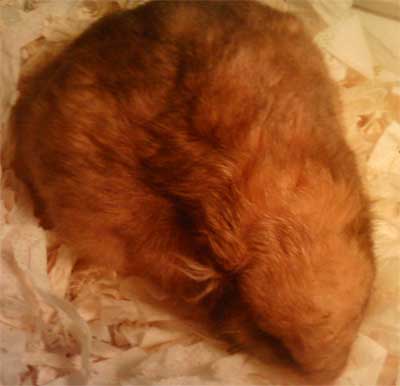| |

A female hamster with ascites showing a distended abdomen |
Ascites
Inside the abdomen is a membrane called the peritoneum, which has two layers? One layer lines the abdominal wall and the other layer covers the organs inside the abdominal cavity. The peritoneum produces a fluid that acts as a lubricant and allows the abdominal organs to glide smoothly over one another. When too much of this fluid (usually serous fluid which is a pale yellow and clear fluid) in the abdominal (peritoneal) cavity, builds up between the two layers this is called ascites. Ascites is usually often associated with liver disease and other long-lasting chronic conditions with an accumulation of watery fluid in the cellular tissues or in any of the cavities of the body, such as the chest or abdomen, and may be due to disease of the heart, liver, kidneys. Ascites will cause rapid weight gain abdominal discomfort and distension. There may be no symptoms associated with a mild ascites. But as more fluid accumulates, increased abdominal girth and size are commonly seen. Abdominal pain, discomfort, and bloating are also frequently seen as ascites becomes larger. The excessive accumulation of fluid may cause breathing difficulties by compressing the diaphragm.
Although there are a number of medical conditions that can cause the abdomen of a hamster to swell, or become distended. In the female hamster the most common, but not limited to, is Pyometra. Cysts, tumours and abscesses rarely tend to be symmetrical (meaning both sides of the abdomen.) A swelling on one side of the abdomen only may indicate one of these symptoms. Liver or kidney failure can affect both male and female hamsters equally and cause a swelling of the abdomen. Failure of the liver or kidneys can cause ascites, also known as dropsy, or abdominal dropsy. Usually, it is older hamsters that may develop ascites as the liver or other organs start to fail. Dropsy is most commonly due to severe liver disease, but any medical condition that causes the blood to become poisoned or the red corpuscles to die may result in dropsy. Blood that cannot flow through the liver because of the increased pressure leaks into the abdomen and causes ascites. The presence of ascites may indicate other significant medical problems and symptoms
of many types of cancer, typically advanced cancers of the organs in the abdominal cavity, colon cancer, stomach cancer, and ovarian cancer.


|
|


